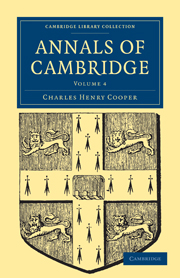WILLIAM THE FOURTH
Published online by Cambridge University Press: 29 August 2010
Summary
1830.
King William the Fourth was proclaimed with the accustomed formalities by the University and by the Sheriff of the County on the 30th of June, and by the Corporation on the following day.
On the 15th of July, being the day of the funeral of King George the Fourth, there was an entire cessation from business. The University went in procession from the Senate House to Great St. Mary's, where after the Litany and an Anthem, Dr. Chafy Vice-chancellor, preached from Ist John ii. 17. The Corporation also went in procession from the Town Hall to St. Sepulchre's, where a sermon was preached by the Rev. R. R. Faulkner, from Mark xiii. 33. Minute bells were tolled during part of the day at all the churches, and in the evening a dumb peal was rung at Great St. Mary's. On the following Sunday, funeral anthems were sung at the Chapels of King's and Trinity Colleges.
On the 19th of July, an address from the University to the King congratulating him on his accession and condoling on the death of his brother, was presented at St. James's, by his Royal Highness the Duke of Gloucester Chancellor of the University, accompanied by Dr. Chafy Vicechancellor, the Earl of Hardwicke High Steward of the University, His Royal Highness the Duke of Sussex, the Dukes of Gordon and St. Albans, the Marquess of Lansdowne Marquess Camden, the Earls of Denbigh, Aberdeen, and West-moreland, Earls Brownlow and Nelson, Viscounts Barnard and Palmerston, Dr. Monk Bishop of Gloucester, Lord F. Beauclerc, Right Hon. Henry Goulburn Chancellor of the Exchequer, Sir Stratford Canning, most of the Heads of Houses and principal officers of the University, and other noblemen and gentlemen, in all above 400.
- Type
- Chapter
- Information
- Annals of Cambridge , pp. 566 - 608Publisher: Cambridge University PressPrint publication year: 2009First published in: 1845



